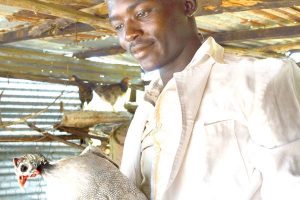Antony Okoth is one of the few young men in Kisumu County who have decided on farming as his preferred career. The 24-year-old shocked many at his Kabol village in Nyakach sub-county when he opted out of the teaching profession to venture into farming full time.
“The little salary I earned as a teacher could not hold my raging passion to jump into farming as full time employment,” he says. Okoth says the notion that farming is a “dirty” job for illiterate people in society is a misconception.
And he is a cheerful fellow as he takes us on a walk round his one-and-a-half-acre farm, narrating his successes. Apparently, what he started out as a hobby long before he joined a teachers training college is now a rewarding business opportunity, netting him on average Sh.50, 000 per month.
Early in 2014 and armed with a measly Sh.3, 000, Okoth had tried to domestic wild birds — guinea fowls and cranes—for ornamental purposes in 2014. When the birds increased, he started exploring possible markets for the birds from hoteliers in Sori, Migori County and in Nakuru County.
Lucky to get a ready market, the farmer sold part of his bird stock, earning about Sh.100, 000. From these proceeds, Okoth pursued a primary teacher career.
Fresh from college, he worked as a teacher at a private school in Kisii County, but the small salary— about Sh.13,000 per month— disappointed him as it could hardly sustain his livelihood. Early this year, he resigned from teaching to give farming a full-time commitment.
And he has no regrets. “From farming I earn about Sh.50,000 monthly, which is likely to grow depending on demand for my farm produce,” he says, smiling.
To increase his profits, the farmer has since diversified into keeping other domesticated animals such as ducks, doves and rabbits. He says keeping rabbits is quite profitable due to the high demand.
He sells mature rabbits on orders from hotels but he also has a contract with the University of Nairobi’s Department of Health Science as supplier of rabbits. Okoth also keeps dairy goats, guinea pigs and hybrid chicken. However, due to a good income from guinea fowls, he intends go on keeping them in large stocks. “Guinea fowls are rare birds which can generate good money.
A mature one goes for about Sh2,500 which is more than three times the price of an ordinary chicken,” says Okoth. The birds’ eggs have a high nutritious and medicinal value so they fetch better prices than chicken eggs, each going for as high as Sh300.
Currently, the farmer has a population of about 20 guinea fowls and at least four birds are sold off each month. Guinea fowls have one big advantage over other birds— they are easy to maintain as they are free ranging and are disease-free.
“The birds mature faster and start laying eggs at between five to six months old. When well managed, a hen can lay up to 60 eggs in a season,” he explains.
Given a higher income, Okoth is not contemplating going back to teaching. “I am in farming to stay because I have tested the sweetness that comes along with it,” he says. A decent living and food security are some of the achievements he is proud of.
He plans to upgrade his farm into a small community-based organisation where he can start training youth and other upcoming local farmers in farming enterprises.
His farm is registered with the Department of Social Services as Nyolo Nyambaja Farm, from which the group’s name will be drawn.
“The aim is to empower the youth to take up farming as a potential source of employment,” says the farmer, adding that he wants the entire community to benefit from his agri-biz skills. Already, Okoth has donated hens to some youths in the neighbourhood.
“Young people should engage in farming because it has untapped potential,” he urges. Despite his successes, the farmer lists lack of farm space and harsh weather experienced in parts of Nyakach especially during dry seasons as challenges to his farming activities. Nevertheless, his farm remains a one- stock-shop where customers flock to get varied products.












